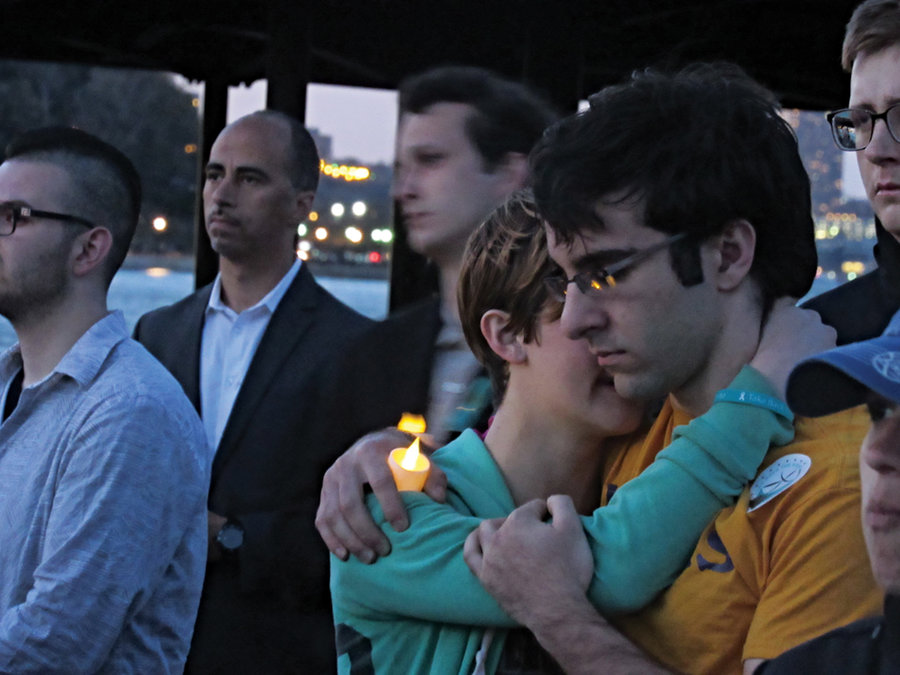She arrived late to the party, and most of the people there were already drunk.
This past Tuesday, April 19, Dr Meika Roberson, the chief medical officer for CarePoint Health at Hoboken University Medical Center, told a crowd about an experience she had during her freshman year in college.
Over a hundred people stood silent holding electronic candles as they listened to her story.
Roberson remembered suddenly seeing “a really cute guy” who she had flirted with in class.
With alcohol on his breath and bloodshot eyes, he steered her “away from the noise,” and before engaging in sexual activity, she told him clearly, “No.”
“Just in case you didn’t hear me, I told him ‘no’!” she emphasized, fighting back tears.
She told the story as part of “Take Back the Night” – a sexual awareness demonstration that takes place internationally, and held this past Tuesday on the Hoboken waterfront at 7:30 p.m.
Roberson continued, “But he didn’t hear me or he didn’t want to hear me.”
Roberson, like many victims, did not bother to report her case.
“Other than the physical and mental trauma, the general lack of victim support via law enforcement and societal standards can inflict even more trauma.” – Victoria Meyer
____________
The state is among others considering legislature introduced in 2014 that proposes colleges adopt an “affirmative consent” bill making it clear that students say which activity they wish to engage in – shifting from a “no means no” mentality to a “yes means yes.”
The second annual march to bring awareness to sexual assault ran from the Stevens Institute of Technology’s campus to Pier A as students, residents, and Mayor Dawn Zimmer held signs and chanted, “Shatter the silence, stop the violence,” “Our bodies, our lives,” and “We have the power, we have the right, we are here to take back the night.”
One of every six people has been sexually abused, 83 percent of sexual assaults are committed by an acquaintance, and 90 percent of victims who knew their attacker did not report the crime, according to pamphlets hounded out during the event.
Manisha Shah, program director of Hudson S.P.E.A.K.S, a nonprofit that advocates against sexual assault in Hudson County, said right before the march, “I think one of the biggest misconceptions surrounding sexual assaults is that because a campus comes forward and takes part and makes a big deal about the issue, people may think it’s an issue on their campus.”
Shah says that it’s not so much in the sense that students are being attacked as part of an epidemic, but more so that it’s common enough to necessitate a conversation. Still, women are often pushed into some forced contact. In response to a 2015 survey commissioned by the Association of American Universities, in a case study of 27 higher education institutions in the U.S, 27.2 percent of female college seniors said they had experienced a form of unwanted sexual contact.
Where Stevens stands
Some activists believe rapes are underreported on campuses.
According to federal data, New Jersey’s public and private colleges reported 91 sexual assaults to the authorities in 2013 but experts and students believe there are far more.
In online records provided by Stevens published on www.stevens.edu, 0 cases of rape, statutory rape, forcible and non-forcible sex offenses combined were reported from 2013 to 2014. Stevens said they won’t release reports for 2015 data until October.
Hoboken’s itself reported nine “rapes” in 2015, which can include any kind of forced touching such as someone grabbing the buttocks of a passerby.
When university officials were asked whether the on-line figures are definitive, Sara Klein, assistant vice president for student affairs told the Reporter, “[It’s] a national trend that these types of issues are often unreported.”
“Reporting can be a difficult process for anyone, so we work hard to educate the campus community about their options for reporting as well as how to intervene in situations as a bystander to prevent situations from occurring,” she added.
Stevens also offers programs and initiatives throughout the year to educate the campus community on sexual assault, consent, and bystander intervention, as well as offer a confidential resource for victims.
U.S. News says for the 2015-2016 school year, Stevens has 2,053 male and 839 female undergraduate students.
Incapacitated means no consent
Across the river in New York, a law was already passed last July surrounding affirmative consent.
The act says “consent cannot be given when someone is incapacitated [which includes intoxication].”
Being taken seriously post-assault drives friends away, according to Victoria Meyer – a survivor and advocate for Hudson Speaks who spoke at the vigil as well.
“Other than the physical and mental trauma, the general lack of victim support via law enforcement and societal standards can inflict even more trauma,” she said.
Experiences submitted by anonymous victims were shared at the vigil.
One wrote of nearly being assaulted at a party before a friend intervened by bursting open the door. However, her friend, and other peers, treated her different after the incident.
“I think I’ll be forever hurt and saddened by the way my best friend reacted,” a student read from the words of the anonymous victim. “I couldn’t believe the people I loved could victim-blame and make me feel so insignificant. I did nothing wrong.”
Steven Rodas can be reached at srodas@hudsonreporter.com.
